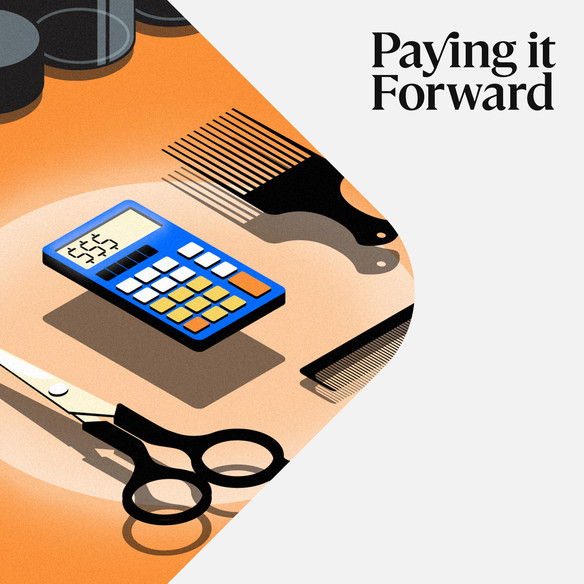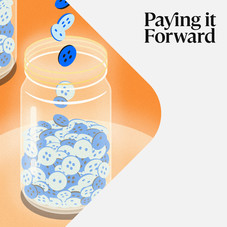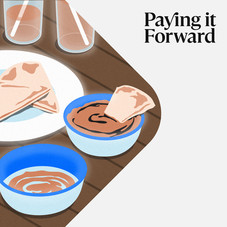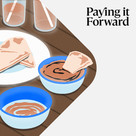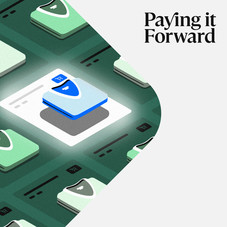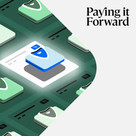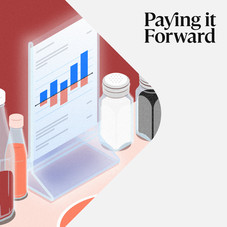Table of contents
“If the first quarter is anything like what the rest of this year is going to be like, it’s going to be amazing. Usually the first quarter of the year is the slowest for a hairstylist,” says Salon Madison James Owner Megan Marron. “This first quarter I was up a thousand dollars more than I was fourth quarter last year, and in my business fourth quarter is the busiest time of year.” Business has been anything but usual for Marron. In 2020 she was juggling to accommodate customers for closings and reopenings while continuing to employ her staff. So Marron took on a loan.
“We’ve got a strong stylist team of three of us currently, and we love it. We are truly a family atmosphere. When the pandemic hit, it was crazy. It was absolute craziness,” remembers Marron. By taking on a small-business loan, she was able to stay afloat during the ten weeks she and her staff couldn’t work as well as hold off on charging booth rent.
As to when the right time is to take out a loan, that depends on the business. “Some people think that you only take out a loan if your business is not doing well. That’s certainly not the case. Many small businesses will take out a loan to help develop and grow their business,” says Jessica Jiang, Square Financial Services’ head of capital markets and investor relations. She adds that if you’re considering whether to take on a business loan, take on as much as you’re comfortable with and be sure to know the terms and repayment times of that loan before you commit.
A little bit about this episode on small-business loans …
Lines of credit, small-business loans, even credit cards — there are so many financing options to choose from, it can be difficult to decide what’s best for your business, let alone what all your options are. Hear firsthand from a small-business owner who has taken out a loan and some of the unexpected obstacles she encountered along the way.
When it comes to running a small business, tackling financial decisions can be daunting and often overwhelming. Each week we’ll focus on a common financial issue, bringing in an expert in the field with actionable insights and a fellow business owner who has tackled it firsthand.
Guests
- Megan Marron, owner of Salon Madison Jane, a hair salon in Taylorville, Illinois
- Jessica Jiang, head of capital markets and investor relations for Square Financial Services, Square’s de novo bank
More resources
- Read: Why a Business Credit Score Matters
- Read: A Comprehensive Guide to Business Loans
- Try: Learn how Square Capital Can Help Your Business Grow
- Try: What Is Refinancing and How Does it Work?
Full transcript:
You’re listening to Paying it Forward, a Square Podcast. When it comes to running a small business, tackling financial decisions can be daunting and often overwhelming. Each week we tackle one issue that could affect your business’ cash flow and hear from a fellow business owner experiencing it first hand.
On today’s episode we dig into loans. A recent Square survey showed that 40% of small-business owners have used outside financing, like loans or credit, to help grow their operations, many of these for the first time in 2020. Of those surveyed, only 50% of women-owned businesses have ever taken on outside financing, not only in 2020, but in years prior.
So what exactly is a loan? And what are some of the obstacles that small-business owners face when they make the decision to take on financing?
Jessica: When a business should take out the loan? I think that really depends on the business’s needs. Some people think that you only take out a loan if your business is not doing well. That’s certainly not the case. Many, many small businesses will take out a loan to help develop and grow their business.
That’s Jessica Jiang, head of capital markets and investor relations at Square Financial Services, Square’s de novo bank. She says, “There are several types of loans small businesses may consider.”
Jessica: Not having a track record certainly is a big challenge. And not having been in business for a while is really a catch-22. You kind of want funds to kick-start a business, but you need a track record to get a loan, so that’s a little tricky. But, it’s never too early to start building your business’s credit score. You can do that by getting a business credit card, which is generally easier to get than getting a business loan and you can do that by working with vendors who report timely payments to credit bureaus. Tou can open a business bank account.
Actually, not having a business account is another challenge that a lot of small businesses face. Because a lot of lenders look for things like account statements. So if possible, businesses should definitely look to open one. It’s also good to have clean and accurate bookkeeping. And having a bank account also helps prove that your business is not just a hobby.There are many different types of loans. The most common ones are term loans, where the borrower will get a lump sum up front and then make weekly or monthly payments for a set period of time to repay the loan. Another kind of loan is a credit card. A credit card is a revolving loan, which means that there is a set credit limit. And then the owner of the card can repeatedly borrow money up to the limit and repay that amount over time as well. Anytime you’re paying for something with a credit card, it’s effectively the equivalent of taking out a small loan. So if the balance is paid in full immediately, then there’s no interest charged. But if there is a balance that is carried over and unpaid, then interest will be charged each month until the loan is paid off.
Now, there are personal loans and small-business loans. Personal loans can be used to make any type of purchase, or it can be used for debt consolidation. Borrowers will usually have to provide some form of income verification or proof of assets to show that they will be able to repay this debt in the future. Even for small-business loans, there are several types. While there’ve been more and more small lenders in the last few years, or the last decade really, the most popular kind of small-business loans are those through either banks or the SBA, which is the Small Business Administration.
Regardless of what type of loan you might be looking for or which lender you choose, it’s important to know that there are two types of loans: secured and unsecured.
Jessica: A secured loan is a loan that’s backed by collateral. The most common types of secured loans are mortgages, where the collateral is your home, and car loans, where the collateral is your car. But collateral can also be stocks, insurance policies, bank accounts, or really anything of value to you and the lender. What happens is, if you don’t pay back your loan, the lender can seize your collateral as payment. And it’s important to note that the repossession can also stay on your credit report for a few years. Home equity loans and home equity lines of credit, also known as HELOCs, are also forms of secured loans. Unsecured loans, on the other hand, require no collateral. Student loans, personal loans, they are unsecured business loans as well. Given that there’s no collateral, unsecured loans are riskier for the lender. And so the unsecured loans generally have a higher interest rate and a lower borrowing limit than a secured loan.
For the same reason, a secure loan is generally easier to get than an unsecured loan. For SBA loans, those require a personal guarantee. And then the business owner’s assets are often used as collateral for those types of loans.
Jessica says this is the piece of advice she would give to a small business owner considering taking on a loan.
Jessica: Before you take out a loan, whether it’s personal or small business, secured or unsecured, definitely make sure that you have a payoff plan. And you should only borrow what you need and can afford to pay back, even if the offer you’re given is bigger. Just because you can get a loan does not necessarily mean you should take one. So definitely make sure you’re comfortable with the terms of the loans and the repayment timeframe before committing to the loan.
You’re trying new ways to sell, making tough financial decisions, doing what it takes to make your business succeed. You aren’t alone. Join us on Square’s Talking Squarely podcast, where independent business owners just like you get real about the ups and downs of running a business. Listen and subscribe to Talking Squarely.
Our guest today is Megan Marron, a salon owner based in Taylorville, Illinois. She’s been running her brick-and-mortar location for several years now and has hired employees. As her business continued to grow, she took on a loan. Taking on financing can be a difficult decision to make and manage. So what would she change if she could start all over again?
Megan: I got started in the cosmetology field back in 2012. I graduated cosmetology school, and then two years later I decided I wanted to become an educator. I just knew there was something more than being behind the chair. So I went back to cosmetology school to get my educator’s license. And in the meantime, I became a brand educator for a company that I worked with for seven years. So for a while I was killing it and myself, working three crazy schedules, both behind the chair and in the school and as a traveling educator. So back in 2018, I purchased an existing salon. And from there I just created my new home, and it’s called Salon Madison Jane. We’ve got a strong stylist team of three of us currently, and we love it. We are truly a family atmosphere, which is what I love.
When the pandemic hit, it was crazy. It was absolute craziness. I will be honest with myself and my staff — I was able to not charge them booth rent during that time. Very thankful I was able to cut them a break, as I was being cut a break from other people in my life as well. So I was able to pay that forward, which I loved. And they did too. But I definitely was not financially prepared for that pandemic. And I don’t know if anybody truly was. In Illinois we were off work for 10 weeks, so that was 10 whole weeks without any income, which was really hard.
With uncertainty around when business would resume as usual, Megan took on a loan.
Megan: I was able to pay my mortgage. I was able to pay my utility bills, because they did not get forgiven during the pandemic. I still had to pay my power, I still had to pay my water and still had to pay my mortgage at the salon. So I was able to use it to pay my bills. And then I was able to use it to purchase product that I could use to retail. I make cute little packages for my clients and I called them, I had cute little names for them, that were just to help them keep their hair nice and healthy at home during the pandemic, while we were in lockdown.
I’ve had Square loans previously, and the whole system is flawless. It is so easy. The repayment plan, you don’t even think about it. For me, that it’s offered, you click a button, you agree to the terms, and you have money in your account the next day.I don’t have to jump through hoops. I don’t have to hope and pray that I’m going to get accepted. And I don’t have to provide a ton of documentation that I would have to go and dig around to find. It’s there, it’s available, and it’s easy.
I actually had this conversation with a friend of mine today about how he was talking about in his business he obtained the PPP loan, or he’s going through the process of getting it. And I said, “Personally, I just can’t.” I think honestly that it just comes from women; it’s just our characteristic to be caregivers. And I think it’s hard for a lot of us to ask for help. So for me to apply for a loan like that and being afraid of getting turned down or whatever — just asking for help I think is just hard for most women.
While many small-business owners turned to PPP loans during the pandemic, Megan felt that a traditional small-business loan was a better fit.
Megan: I belong to the Thrivers Society, which is an amazing business group for hairstylists from Britt Seva. Britt was able to really give us the ins and outs of the PPP loan. And in that group we also talked a lot about what’s required of you, what you need to do, how to obtain it. And there were a lot of people in our group who did obtain the PPP loan, but then there were also a lot of people in our group that decided absolutely not. It just was not right for them and their business. So that’s how I started it. I did check into the loan application process, and I decided I did not want to deal with it. First off, having to have all your documentation ready for all of that, for the application process. But then knowing that you have to have such perfect records to keep, to turn everything in afterwards in order to get it forgiven. Plus, I’m a sole proprietor, so I don’t necessarily have a quote “paycheck.” I get paid every time that somebody finishes a haircut.
So for me, I don’t have a payroll, which is basically what the whole thing is about is the payroll tax — or not tax, but the payroll to protect your paycheck. So for me, having to then create a whole other account to have a payroll system in place, it was just a lot of work that didn’t feel necessary personally.
Taking on a loan came along at the right time, giving Megan the ability to sell products and deliver them through porch drop-offs. This income stream helped offset the weeks the salon was closed for in-person business. So how is her salon planning for the coming months?
Megan: If the first quarter is anything of what the rest of this year is going to be like, it’s going to be amazing. Usually the first quarter of the year is the slowest for hairstylists. And not just hairstylists, most business ventures, it is the least profitable months of the year. This first quarter I was up a thousand dollars more than I was fourth quarter of last year, and in my business fourth quarter is the busiest time of the year. The last quarter of the year is right around the holidays. Everybody wants their hair to look on point for their Christmas pictures, which they usually take around October. So you’re going to be around a lot of family. You’re going to be around your coworkers at Christmas parties or holiday parties. So fourth quarter is so huge in my industry that hairstylists make 30% of their annual income in the last two months of the year.
And I will be completely honest with you, it is true. It is 1,000,000% true. So if that’s a projection for the rest of this year, it’s going to be a great year. I’m super excited for it. As far as what I am doing for the rest of the year, my goals are to really boost my marketing on social media and to up my game a little bit. I have some classes that I’m planning on taking this year that are pretty big investments, but I’m super excited for them, and for the business [that’s] going to come from the knowledge I learned in my classes that I’m going to be taking this year. So it’s going to be a really good year. I’m excited for it.
Whether you’re working through a payment plan right now or simply thinking about a loan, here’s the advice Megan would share with a small-business owner trying to grow their business.
Megan: The best piece of advice I could ever give somebody when they are starting in business for themselves is to take the amount of money that you think you’re going to need and double it. Because let’s say you think that you’re going to need a thousand dollars to spend to pack your retail shelves. Double it, because you’re definitely going to need more. And as far as getting a loan, go with your gut; don’t put yourself out. Do what is attainable and is smart for you and your bottom dollar, and do not over-exert yourself financially. Because that first year, you usually do not make an income, whenever it’s all said and done, your first year in business. But if you go about it the smart way and do what is best for yourself and your bottom dollar, you’re going to be golden.
Our small-business owner Megan mentioned Square loans in today’s episode. Square loans are not currently open to the public. If you’re a small-business owner currently using Square for processing, there’s no application fee. Square’s models will underwrite you based on the health of your business, and you will receive a loan offer on your dashboard or via email.
Thank you to Jessica Jiang and Megan Marron for their thoughts on loans for small businesses. Jessica Jiang is head of capital markets and investor relations for Square Financial Services, Square’s de novo bank. Megan Marron is the owner of Salon Madison Jane. Find them at Salon Madison Jane on Facebook or follow Megan’s personal page at Meg at Salon Madison Jane. If you want to hear more like this, make sure to subscribe to Paying It Forward on Apple Podcasts, Spotify, or your podcast app of choice.
You’ve been listening to Paying It Forward, a Square production. This episode was produced by Deborah Findling, Camille Kail, and Clara Shannon. Our music was composed by Jordain Wallace, with sound recording by Sorrentino Media and D.R. Baker. Thanks for listening.
All loans are issued by Square Financial Services, Inc., a Utah-chartered industrial bank, member FDIC, located in Salt Lake City, Utah. A minimum payment of 118th of the initial loan balance is required every 60 days, and full loan repayment is required within 18 months. Actual fee depends upon payment card processing history, loan amount, and other eligibility factors. Loan eligibility is not guaranteed. All loans are subject to credit approval. Square, Inc. is a financial services company, not a bank. Banking services are provided by Squares banking affiliates, Square Financial Services, Inc., or Citizens Bank, members FDIC.
![]()

